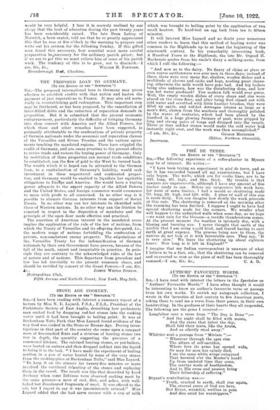THE PROPOSED LOAN TO GERMANY.
[TO THE EDITOR OF THE " SPECTATOR."]
SIR,—The proposed international loan to Germany may prove effective to establish credits with that nation and hasten the payment of just reparations to France. It may also aid mate- rially in re-establishing gold redemption. This important step may be furthered, as has been proposed, by the cancellation of inter-Allied debts and the reduction of reparation demands in proportion. But it is submitted that the present economic embarrassment, particularly the difficulty of bringing Germany into close concert with America and the Allied Powers, for which these and other remedies have been suggested, is primarily attributable to the confiscations of private property of German nationals under the economic and reparation clauses of the Versailles and Sbvres Treaties and the various agree- ments touching the mandated regions. These have crippled the credit of Germany, and are causa proxima to the present efforts to revive trade and restore the buying power of Germany. Only by restitution of these properties can normal trade conditions be established, can the flow of gold to the West be turned back. The wealth which it is hoped can be attracted to the German loan, to a capitalization of Germany's liability, would seek investment in these sequestered and confiscated proper- ties, and Germany would be enabled to liquidate her equitable obligations to EurEpe and America. She would have a buying power adequate to the export capacity of the Allied Powers and the United States, and foreign commerce would commence to move with profit to all concerned. In no other way is it possible to alienate German interests from support of Soviet Russia. In no other way can her interests be identified with those of Western nations. In no other way can the friction be removed in respect to the disposition of mandates and the principle of the open door made effective and practical.
The assertion of American interest in the mandated areas implies the application of the rule of the law of nations, from which the Treaty of Versailles and its offspring derogated, i.e., the modern usage of nations forbidding the confiscation of private, non-combatant enemy property. The stipulations of the. Versailles Treaty for the indemnification of German nationals by their own Government have proven, because of the fall of the mafk, unjust and inequitable in practice. In prin- ciple they are contrary to the acknowledged rules of the law of nature and of nations. This departure from precedent and law has led inevitably to the present economic chaos, and should be rectified by concert of the Great Powers.—I am, Sir, Metropolitan Club,
JOSEPH WHITLA STINSON.
Fifth Avenue and Sixtieth Street, New York, May 24th.


































 Previous page
Previous page